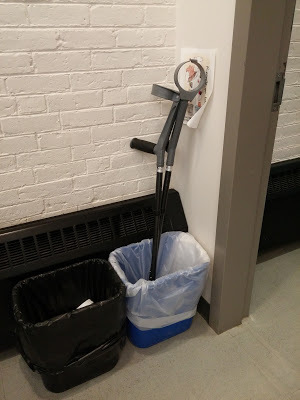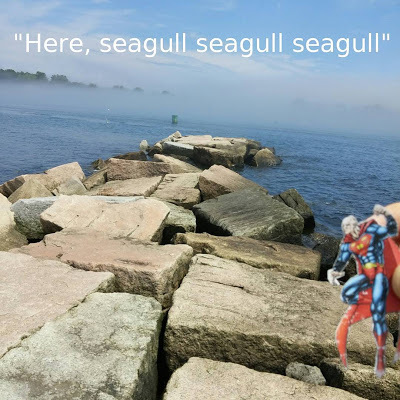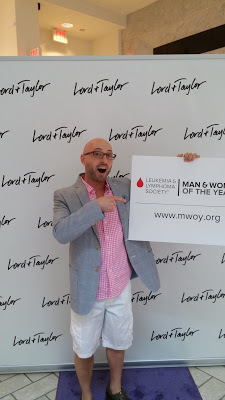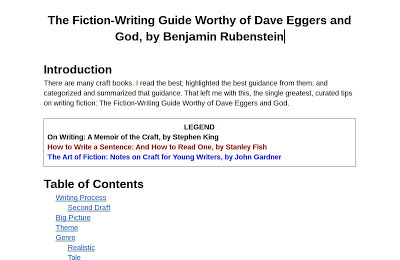Benjamin Rubenstein's Blog, page 7
August 1, 2016
I’m Proud to Be Like My Dad
Two months ago I shared an interview I conducted with my dad for Huffington Post's new blog series "Talk To Me." Huffington Post promoted it on its Facebook Page and then later asked me to write a story and re-post the video on its site.

As published in The Huffington Post
I was 12 when my dad and I took our first trip as just the two of us. As he drove his brand-new minivan while listening to country music, I tested all the buttons and levers and seats and I counted the total number of cars he passed: two. My dad may have been the only country music-loving, minivan- and slow-driving Jew from Brooklyn, but damn could he tell stories.
He told me one of my favorite stories of his on that trip. Back when he had attended college at Hofstra University in Long Island, New York, he played percussion in the marching band. After practice he and his fellow band members ate dinner at a little-known buffet nearby with all-you-can-eat steak for a special price on Mondays.
My dad mentioned the deal to one of the football players whom he was pretty sure played on the offensive line. Keep reading I’m Proud to Be Like My Dad




As published in The Huffington Post
I was 12 when my dad and I took our first trip as just the two of us. As he drove his brand-new minivan while listening to country music, I tested all the buttons and levers and seats and I counted the total number of cars he passed: two. My dad may have been the only country music-loving, minivan- and slow-driving Jew from Brooklyn, but damn could he tell stories.
He told me one of my favorite stories of his on that trip. Back when he had attended college at Hofstra University in Long Island, New York, he played percussion in the marching band. After practice he and his fellow band members ate dinner at a little-known buffet nearby with all-you-can-eat steak for a special price on Mondays.
My dad mentioned the deal to one of the football players whom he was pretty sure played on the offensive line. Keep reading I’m Proud to Be Like My Dad



Published on August 01, 2016 20:31
July 19, 2016
Lessons From My MFA Creative Writing Program
In the moments after I listen to each new episode of the Tim Ferriss Show, I want to redesign my entire life. Especially after The Terminator was a show guest. In other words, I'm easily inspired. After completing my second residency in my master's of fine arts in creative writing program, I felt like I absorbed the one-liners from all of Arnold's movies since Conan.
I can't properly show you how meaningful this Stonecoast experience has been for me, but I can share some of the insights I transcribed. I think many of these are true in writing and storytelling and life.
Author Rick Bass says:
So much of writing is physical. You have to be in shape for it.If you have a story focusing on sadness, contrast it with a paragraph about great joy. Always be aware of the opposite.Your answer to any question about writing is "specificity." It overrides everything.If you have to use a big moment to keep your reader engaged then maybe you have bigger problems.Write a great sentence. Your next sentence has to be even better. And the next even better. That's how you keep the reader engaged.Short stories are a time-tested way for humans to relate to each other.The first sentence in a story is the second most important; the last sentence is the most important. Get the reader to commit to the journey.
Rick Bass is a fascinating man and he led me to coin a term: when your writing group is critiquing your story in workshop then you're getting "Rick Bassed." This diagram he scribbled on short story structure only increases my fascination of him.

See author Justin Tussing's insights I transcribed after my first residency in January.



I can't properly show you how meaningful this Stonecoast experience has been for me, but I can share some of the insights I transcribed. I think many of these are true in writing and storytelling and life.
Author Rick Bass says:
So much of writing is physical. You have to be in shape for it.If you have a story focusing on sadness, contrast it with a paragraph about great joy. Always be aware of the opposite.Your answer to any question about writing is "specificity." It overrides everything.If you have to use a big moment to keep your reader engaged then maybe you have bigger problems.Write a great sentence. Your next sentence has to be even better. And the next even better. That's how you keep the reader engaged.Short stories are a time-tested way for humans to relate to each other.The first sentence in a story is the second most important; the last sentence is the most important. Get the reader to commit to the journey.
Rick Bass is a fascinating man and he led me to coin a term: when your writing group is critiquing your story in workshop then you're getting "Rick Bassed." This diagram he scribbled on short story structure only increases my fascination of him.

See author Justin Tussing's insights I transcribed after my first residency in January.



Published on July 19, 2016 15:17
July 17, 2016
I Created This Fictional Character on Instagram
Instagram lends itself to fiction and I just created my second character on the social network. Follow my "quadsteppers" if you want some silliness sprinkled with all the selfies in your Instagram feed.

Sometimes I use crutches, or what I call quadsteppers, but I don't want to carry them once I reach my destination. So I place them behind couches and under seats; prop them against walls; plop them in recycle bins. In what other ridiculous places can I stow my quadsteppers? Find out on Instagram.com/quadstep.
You can also follow Cancerslayer, who is my first fictional character on Instagram.com/benrubenstein. Cancerslayer fights illness by day and bad guys by night. He goes around the world and says lots of stupid shit. Follow him if you want to get dumber.





Sometimes I use crutches, or what I call quadsteppers, but I don't want to carry them once I reach my destination. So I place them behind couches and under seats; prop them against walls; plop them in recycle bins. In what other ridiculous places can I stow my quadsteppers? Find out on Instagram.com/quadstep.
You can also follow Cancerslayer, who is my first fictional character on Instagram.com/benrubenstein. Cancerslayer fights illness by day and bad guys by night. He goes around the world and says lots of stupid shit. Follow him if you want to get dumber.




Published on July 17, 2016 18:48
June 5, 2016
Talk To Me: Me, My Dad, and Foul-Tasting Medicine
When Justin Halpern's hilarious hit book Shit My Dad Says published, I thought, I wish I thought of that first! My dad has been sharing with me his goofball stories, philosophies, and OCD-like behaviors my whole life. I have written about him, of course in my books and also in this blog about his thoughts on exercise and clothing. Now I get to share an interview I conducted with him.
Two months ago The Huffington Post invited me to be part of its new video series called Talk To Me in which children interview their parents. The Huffington Post is sharing many of these interviews online and I hope they share this interview so even more people can enjoy my dad's quirkiness, but if not then I still enjoyed the interview process.
I hope you enjoy this short interview I conducted with my dad in which we speak about his time managing a division in the federal government during the 1995 shutdown, the value of health, and foul-tasting medicine. I asked my 71-year-old dad what one thing he wishes he knew when he was my age.
You can watch our interview on YouTube or directly below if your web browser allows.
Media
I've now appeared in my first short film, for at least three seconds (around 3:30). The non-profit Teen Cancer America traveled around the country interviewing teenage cancer patients and survivors of teenage cancer from every state. I got to represent Virginia. I'm going to change my LinkedIn profile's job title to author/speaker/horrible actor for three seconds.



Two months ago The Huffington Post invited me to be part of its new video series called Talk To Me in which children interview their parents. The Huffington Post is sharing many of these interviews online and I hope they share this interview so even more people can enjoy my dad's quirkiness, but if not then I still enjoyed the interview process.
I hope you enjoy this short interview I conducted with my dad in which we speak about his time managing a division in the federal government during the 1995 shutdown, the value of health, and foul-tasting medicine. I asked my 71-year-old dad what one thing he wishes he knew when he was my age.
You can watch our interview on YouTube or directly below if your web browser allows.
Media
I've now appeared in my first short film, for at least three seconds (around 3:30). The non-profit Teen Cancer America traveled around the country interviewing teenage cancer patients and survivors of teenage cancer from every state. I got to represent Virginia. I'm going to change my LinkedIn profile's job title to author/speaker/horrible actor for three seconds.



Published on June 05, 2016 20:56
May 18, 2016
Continued Phallic Stage
My first fiction story to publish is about a penile operation.
During my first residency at Stonecoast, everyone talked about "submitting." I knew what that meant—my agent and I had submitted my first book about a hundred times before landing a publisher. I just didn't realize I could submit anything.
I began researching publications. There are so many, for every genre and story length. I created an account on The (Submission) Grinder to track my work. And then I submitted two stories to a total of six publications, and have since received three rejections and one acceptance by the website A Story In 100 Words which publishes stories exactly 100 words long.
Enjoy my first published fiction story titled "Continued Phallic Stage."
 As published on A Story In 100 Words
As published on A Story In 100 Words
Clifford consulted his companion Coleman before Clifford’s penis-extending surgery.
Clifford: I’ll be courteous to Doctor Coen. A Clip Magazine column confirms kindness cultivates better care.
Coleman: Christ you’re crazy!
Clifford: You conclude I should be cruel? Then Doc Coen might compress it! Conceivably I could court him with chocolates.
Coleman: Chocolates, come again? Keep reading Continued Phallic Stage



During my first residency at Stonecoast, everyone talked about "submitting." I knew what that meant—my agent and I had submitted my first book about a hundred times before landing a publisher. I just didn't realize I could submit anything.
I began researching publications. There are so many, for every genre and story length. I created an account on The (Submission) Grinder to track my work. And then I submitted two stories to a total of six publications, and have since received three rejections and one acceptance by the website A Story In 100 Words which publishes stories exactly 100 words long.
Enjoy my first published fiction story titled "Continued Phallic Stage."
 As published on A Story In 100 Words
As published on A Story In 100 WordsClifford consulted his companion Coleman before Clifford’s penis-extending surgery.
Clifford: I’ll be courteous to Doctor Coen. A Clip Magazine column confirms kindness cultivates better care.
Coleman: Christ you’re crazy!
Clifford: You conclude I should be cruel? Then Doc Coen might compress it! Conceivably I could court him with chocolates.
Coleman: Chocolates, come again? Keep reading Continued Phallic Stage



Published on May 18, 2016 19:03
May 8, 2016
My Greatest Professional Accomplishment Was a Bureaucratic Miracle
When we achieve our all-time greatest professional accomplishment, we know it right away. Like Dr. Carl June developing a novel way to treat cancer, Mark Sanchez not throwing an interception, and me breaking through bureaucracy in the U.S. federal government to author a column in my organization's 18,000-circulation newsletter.
Last summer, the communications office where I work wanted to create a new feature in our newsletter focusing on a different employee every other week. They asked me to write it. They said, "We want it to be about people's day-to-day lives at work."
I said, "That's boring, how about instead I interview and write about the people who work here, and not write about what they do."
They said, "That would be too long. Not relevant. Nobody would read it."
I wrote one such article anyway, a 1,200-word behemoth. Then I presented it to them and they said the same thing they had said before. I fought harder, asking them to trust me, stating that readers would enjoy it, asking them to give it a chance just one time and see what happens.
I fought and fought for my work until they agreed and it published. And besides messages related to policy, jobs or benefits, it became one of the most read pieces of content ever at my organization.
Now, I write a new article that publishes in our newsletter every other Wednesday. These articles highlight the extraordinary in our seemingly ordinary employees. I've had the privilege to interview and write about an actress, a soldier, a triathlete, a refugee officer, a former refugee, and more.
It's normally inappropriate for me to share these articles on this blog, but during Public Service Recognition Week my organization published four of them publicly. And so I share those four below. Enjoy.
For This Political Refugee, U.S. Was Land of the Free, Home of the Berries
"I don't have a lot of memories from before I was 7 years old. I don’t remember a playground or riding bikes. I don’t remember much about playing except for one event at a refugee camp in the Philippines. Every Friday night someone would set up a play and refugees would watch. I remember that very explicitly being entertaining, maybe just because they made funny noises and made us laugh. I don’t even quite understand what they were talking about." Keep reading For This Political Refugee, U.S. Was Land of the Free, Home of the Berries
Texas Officer: How a Small Gesture Translated Into a New Career
"Growing up, I never knew that life existed outside of the 48-mile radius of Eldorado, Texas," says Maribel (Mary) Gonzalez, an immigration services officer at the Texas Service Center in Dallas. Keep reading Texas Officer: How a Small Gesture Translated Into a New Career
A Refugee Officer's Story: 'Countless Narratives of Suffering and Loss'
For six years, USCIS Refugee Officer Slava Madorsky traveled the world interviewing applicants to determine if they were eligible for refugee status, because of persecution or fear of persecution. For three of those years, until she was able to use a laptop during interviews, she handwrote up to 40 pages of notes each day to record their stories. Once, as she interviewed a man in Baghdad, her pen flew from her hand in a bad case of writer’s cramp. The man – who had been describing torture and being shuttled from prison to prison – laughed. Madorsky apologized. “‘It’s just my hand. I’m not actually throwing a pen at you.’ He was the nicest man in the world. He actually felt bad for me, and I was thinking, ‘Why is this person feeling bad for my stupid hand?’” Keep reading A Refugee Officer's Story: 'Countless Narratives of Suffering and Loss'
How ‘I Will Be Right Behind You’ Means Reuniting 12 Years Later for This Budget Analyst
When Sanh M. was 8 years old, she loosened her fixed grip on her father's hand as he sent her towards a boat that would take her from Vietnam to a refugee camp in Thailand. She says her father told her, "Go…go with your sisters. Your mother, brothers and I will be right behind you." Keep reading How ‘I Will Be Right Behind You’ Means Reuniting 12 Years Later for This Budget Analyst
* * *
Appearances
On April 23, I modeled in a fashion show supporting the 2016 Leukemia & Lymphoma Society Man & Woman of the Year campaign. Two years ago I was a candidate in this fundraiser and my team raised over $50,000. I am proud to continue volunteering for LLS as part of the campaign's "leadership team" which is composed of former candidates. You can contribute to the 2016 Man & Woman of the Year campaign which concludes June 4.




Last summer, the communications office where I work wanted to create a new feature in our newsletter focusing on a different employee every other week. They asked me to write it. They said, "We want it to be about people's day-to-day lives at work."
I said, "That's boring, how about instead I interview and write about the people who work here, and not write about what they do."
They said, "That would be too long. Not relevant. Nobody would read it."
I wrote one such article anyway, a 1,200-word behemoth. Then I presented it to them and they said the same thing they had said before. I fought harder, asking them to trust me, stating that readers would enjoy it, asking them to give it a chance just one time and see what happens.
I fought and fought for my work until they agreed and it published. And besides messages related to policy, jobs or benefits, it became one of the most read pieces of content ever at my organization.
Now, I write a new article that publishes in our newsletter every other Wednesday. These articles highlight the extraordinary in our seemingly ordinary employees. I've had the privilege to interview and write about an actress, a soldier, a triathlete, a refugee officer, a former refugee, and more.
It's normally inappropriate for me to share these articles on this blog, but during Public Service Recognition Week my organization published four of them publicly. And so I share those four below. Enjoy.
For This Political Refugee, U.S. Was Land of the Free, Home of the Berries
"I don't have a lot of memories from before I was 7 years old. I don’t remember a playground or riding bikes. I don’t remember much about playing except for one event at a refugee camp in the Philippines. Every Friday night someone would set up a play and refugees would watch. I remember that very explicitly being entertaining, maybe just because they made funny noises and made us laugh. I don’t even quite understand what they were talking about." Keep reading For This Political Refugee, U.S. Was Land of the Free, Home of the Berries
Texas Officer: How a Small Gesture Translated Into a New Career
"Growing up, I never knew that life existed outside of the 48-mile radius of Eldorado, Texas," says Maribel (Mary) Gonzalez, an immigration services officer at the Texas Service Center in Dallas. Keep reading Texas Officer: How a Small Gesture Translated Into a New Career
A Refugee Officer's Story: 'Countless Narratives of Suffering and Loss'
For six years, USCIS Refugee Officer Slava Madorsky traveled the world interviewing applicants to determine if they were eligible for refugee status, because of persecution or fear of persecution. For three of those years, until she was able to use a laptop during interviews, she handwrote up to 40 pages of notes each day to record their stories. Once, as she interviewed a man in Baghdad, her pen flew from her hand in a bad case of writer’s cramp. The man – who had been describing torture and being shuttled from prison to prison – laughed. Madorsky apologized. “‘It’s just my hand. I’m not actually throwing a pen at you.’ He was the nicest man in the world. He actually felt bad for me, and I was thinking, ‘Why is this person feeling bad for my stupid hand?’” Keep reading A Refugee Officer's Story: 'Countless Narratives of Suffering and Loss'
How ‘I Will Be Right Behind You’ Means Reuniting 12 Years Later for This Budget Analyst
When Sanh M. was 8 years old, she loosened her fixed grip on her father's hand as he sent her towards a boat that would take her from Vietnam to a refugee camp in Thailand. She says her father told her, "Go…go with your sisters. Your mother, brothers and I will be right behind you." Keep reading How ‘I Will Be Right Behind You’ Means Reuniting 12 Years Later for This Budget Analyst
* * *
Appearances
On April 23, I modeled in a fashion show supporting the 2016 Leukemia & Lymphoma Society Man & Woman of the Year campaign. Two years ago I was a candidate in this fundraiser and my team raised over $50,000. I am proud to continue volunteering for LLS as part of the campaign's "leadership team" which is composed of former candidates. You can contribute to the 2016 Man & Woman of the Year campaign which concludes June 4.




Published on May 08, 2016 19:42
April 21, 2016
The Fiction-Writing Guide Worthy of Dave Eggers and God
I am afraid to write fiction.
Two months ago I wrote a jokey blog about being in over my head in my writing program despite having authored two memoirs and an essay that got anthologized. But there is truth in comedy. Compared to the personal stories I've been publishing on this blog the last nine years, writing fiction takes me longer, leads to anxiety, and usually lags in quality.
It doesn't make sense. A story is a story, and the same elements that make a story entertaining cross all genres. But telling myself that didn't help, so I imagined myself as the protagonist, which I usually am in my blog stories. That, too, didn't eliminate my fear.
My next step was to write a guide on writing, developed using notes from the craft books I've heavily studied. For the past two weeks that is all I have done. I spent so much time writing this guide that I lost track of days and felt like a hermit. My hope was that the guide would eliminate my fear of writing fiction; lead me to write better and faster; and make writing fiction as fun as I have writing jokey blogs about myself.

I don't know if the guide will achieve those goals, but I know I completed The Fiction-Writing Guide Worthy of Dave Eggers and God (for now). It is a living document—as I study more craft books I will add to this guide. Ultimately I want a notecard-size list of rules to follow to write a great piece of fiction. Rules, because following rules did well for me against cancer, and following other rules helped me live a more complete life in my twenties.
It seems I will forever thrive on prescriptions, and if this guide achieves its goals then I'll write more guides like this: maybe one on being a more effective person, and definitely one on how to be attractive to women (hint: I think they're one and the same).
But first, I have about 40 pages of fiction to write before May 2. Guide, please guide me.
If you wish to see The Fiction-Writing Guide Worthy of Dave Eggers and God then contact me and I'll share the link to it on Google Docs.



Two months ago I wrote a jokey blog about being in over my head in my writing program despite having authored two memoirs and an essay that got anthologized. But there is truth in comedy. Compared to the personal stories I've been publishing on this blog the last nine years, writing fiction takes me longer, leads to anxiety, and usually lags in quality.
It doesn't make sense. A story is a story, and the same elements that make a story entertaining cross all genres. But telling myself that didn't help, so I imagined myself as the protagonist, which I usually am in my blog stories. That, too, didn't eliminate my fear.
My next step was to write a guide on writing, developed using notes from the craft books I've heavily studied. For the past two weeks that is all I have done. I spent so much time writing this guide that I lost track of days and felt like a hermit. My hope was that the guide would eliminate my fear of writing fiction; lead me to write better and faster; and make writing fiction as fun as I have writing jokey blogs about myself.

I don't know if the guide will achieve those goals, but I know I completed The Fiction-Writing Guide Worthy of Dave Eggers and God (for now). It is a living document—as I study more craft books I will add to this guide. Ultimately I want a notecard-size list of rules to follow to write a great piece of fiction. Rules, because following rules did well for me against cancer, and following other rules helped me live a more complete life in my twenties.
It seems I will forever thrive on prescriptions, and if this guide achieves its goals then I'll write more guides like this: maybe one on being a more effective person, and definitely one on how to be attractive to women (hint: I think they're one and the same).
But first, I have about 40 pages of fiction to write before May 2. Guide, please guide me.
If you wish to see The Fiction-Writing Guide Worthy of Dave Eggers and God then contact me and I'll share the link to it on Google Docs.



Published on April 21, 2016 21:36
April 10, 2016
Writing Exercise: Develop Your Craft by Alternating Perspectives
If you want to improve your writing technique then—just like building physical strength and endurance—exercise. One of the books I read for school, The Art of Fiction by John Gardner, offers many writing exercises. One is to take a simple event and describe it using the same characters and setting in five radically different ways (changes of style, tone, sentence structure, voice, psychic distance, etc.).

The event: A man gets off a bus, trips, looks around in embarrassment, and sees a woman smiling. Below are my five radically different attempts to describe this event. How would you write this scene? Email it to me!
The man, draped in purple velvet—who wears velvet in the summer in Los Angeles?—large enough to play offensive line for the Raiders, and maybe he does play for the Raiders, stood when the bus stopped but the bus didn’t stop completely—it inched closer to the sign in fits and starts—and now the purple man, holding a mobile in one hand and Infinite Jest in the other and no hands on a railing or seat, caught his right foot behind his left and I saw it in slow motion, the world just kind of paused, as he fell forward just tumbling down the bus aisle and I saw him choose—yes, I swear he chose—to drop the mobile and protect the book and not vice versa and he crashed—you’d think it was another earthquake—right on his right shoulder with the novel tucked in his other arm like a football and suddenly I recalled my mother, night after night, reading me fantasy stories before proclaiming the night was over and gently placing the closed book in its proper place on the shelf, never a scratch or mark or scuff. I smiled at the purple man and I believe he felt my mother, too.
In 1987, the National Football League Players Association went on strike and men across the league, like the Raiders’ Jacob Breele, understood the day would come when football would be over, not just for a season but for permanence. So men like Jacob began spending time learning new skills like public speaking and writing. Some men, like Jacob, even visited their first library, checked out their first book, and read their first complete novel. Some men, like Jacob, became so engrossed in their new skills that they forgot that Los Angeles buses were notorious for false stops and Jacob, well known for his false start penalties on the gridiron, fell flat on his face clutching the monster 1,079-page book he adored, smiling at the woman across the aisle thinking that this penalty hurt less than his previous ones.
They thought they owned it all: mansions, bank accounts, sports cars, Sundays, our children’s awe. One word came to mind amid all that greed and gluttony: karma. When the football players lost their jobs to the scrubs, it all came crumbling down on them and commoners could only smile at their supposed suffering. The day star lineman Jacob Breele fell on the city bus, toppling over his own huge body, all Maya could do when their eyes met across the aisle was smile.
Chairs made of brown, faded plastic, stiff as redwoods. Grimy windows locked shut, barred shut, or never able to open to begin with, some so graffitied they lacked all transparency. Air so thick with racism it was equally cloudy. A large, disturbed man covered head to toe in purple velvet falls attempting to exit the bus and all the woman across the aisle can do is laugh at him. Southern California Rapid Transit District, 1987.
Beginning in the womb, our lips stretch, curl upwards at the ends, and we smile. After bruising and tumbling as toddlers, we cry, and then we smile. After heartache in adolescence, we curse the world and the boy or girl who ripped out our insides, and then we smile at the next one we see at lunch. After graduating college, we think, where did those 22 years go?, and then we smile and rejoice with our friends over our accomplishment. After losing our job because our employer thought it could skate by with replacement staff, we wonder where our place is in the world, and we fall over and over, we fall over our savings and our possessions and even the very bus we ride for transportation, and then we smile because we can still pick ourselves back up.
* * *
Appearances
I'll be signing books at the Spring Jewish Food and Heritage Festival on April 17 at Congregation Sons of Israel, in Chambersburg, Pennsylvania, from 12:30 - 3 p.m. See the festival's flyer for information on purchasing tickets. Synagogue address: 209 E. King St., Chambersburg, PA.




The event: A man gets off a bus, trips, looks around in embarrassment, and sees a woman smiling. Below are my five radically different attempts to describe this event. How would you write this scene? Email it to me!
The man, draped in purple velvet—who wears velvet in the summer in Los Angeles?—large enough to play offensive line for the Raiders, and maybe he does play for the Raiders, stood when the bus stopped but the bus didn’t stop completely—it inched closer to the sign in fits and starts—and now the purple man, holding a mobile in one hand and Infinite Jest in the other and no hands on a railing or seat, caught his right foot behind his left and I saw it in slow motion, the world just kind of paused, as he fell forward just tumbling down the bus aisle and I saw him choose—yes, I swear he chose—to drop the mobile and protect the book and not vice versa and he crashed—you’d think it was another earthquake—right on his right shoulder with the novel tucked in his other arm like a football and suddenly I recalled my mother, night after night, reading me fantasy stories before proclaiming the night was over and gently placing the closed book in its proper place on the shelf, never a scratch or mark or scuff. I smiled at the purple man and I believe he felt my mother, too.
In 1987, the National Football League Players Association went on strike and men across the league, like the Raiders’ Jacob Breele, understood the day would come when football would be over, not just for a season but for permanence. So men like Jacob began spending time learning new skills like public speaking and writing. Some men, like Jacob, even visited their first library, checked out their first book, and read their first complete novel. Some men, like Jacob, became so engrossed in their new skills that they forgot that Los Angeles buses were notorious for false stops and Jacob, well known for his false start penalties on the gridiron, fell flat on his face clutching the monster 1,079-page book he adored, smiling at the woman across the aisle thinking that this penalty hurt less than his previous ones.
They thought they owned it all: mansions, bank accounts, sports cars, Sundays, our children’s awe. One word came to mind amid all that greed and gluttony: karma. When the football players lost their jobs to the scrubs, it all came crumbling down on them and commoners could only smile at their supposed suffering. The day star lineman Jacob Breele fell on the city bus, toppling over his own huge body, all Maya could do when their eyes met across the aisle was smile.
Chairs made of brown, faded plastic, stiff as redwoods. Grimy windows locked shut, barred shut, or never able to open to begin with, some so graffitied they lacked all transparency. Air so thick with racism it was equally cloudy. A large, disturbed man covered head to toe in purple velvet falls attempting to exit the bus and all the woman across the aisle can do is laugh at him. Southern California Rapid Transit District, 1987.
Beginning in the womb, our lips stretch, curl upwards at the ends, and we smile. After bruising and tumbling as toddlers, we cry, and then we smile. After heartache in adolescence, we curse the world and the boy or girl who ripped out our insides, and then we smile at the next one we see at lunch. After graduating college, we think, where did those 22 years go?, and then we smile and rejoice with our friends over our accomplishment. After losing our job because our employer thought it could skate by with replacement staff, we wonder where our place is in the world, and we fall over and over, we fall over our savings and our possessions and even the very bus we ride for transportation, and then we smile because we can still pick ourselves back up.
* * *
Appearances
I'll be signing books at the Spring Jewish Food and Heritage Festival on April 17 at Congregation Sons of Israel, in Chambersburg, Pennsylvania, from 12:30 - 3 p.m. See the festival's flyer for information on purchasing tickets. Synagogue address: 209 E. King St., Chambersburg, PA.



Published on April 10, 2016 19:38
April 3, 2016
Our Safari in Tanzania
For me, few things are more fun—and time-consuming—than creating videos.
In February I went on an incredible group safari in Tanzania, in eastern Africa, through the nonprofit First Descents which sends young cancer survivors on free adventure trips. I made a video of our adventure which you can watch on YouTube or directly below if your Web browser allows. You can also read about my trip on First Descents' blog: FDX Africa: This is Way Better Than ‘Planet Earth’.



In February I went on an incredible group safari in Tanzania, in eastern Africa, through the nonprofit First Descents which sends young cancer survivors on free adventure trips. I made a video of our adventure which you can watch on YouTube or directly below if your Web browser allows. You can also read about my trip on First Descents' blog: FDX Africa: This is Way Better Than ‘Planet Earth’.



Published on April 03, 2016 19:43
March 31, 2016
My Batman-Loving Colleague's Opportunity of a Lifetime
I write a lot: for work and school, as a hobby, in my sleep. It is usually not appropriate for me to publish what I write for work, but I can in this case. Yesterday this story I wrote about my colleague published in my organization's newsletter. Enjoy.
* * *
James Olsen, an ace interviewer at Manhattan's immigration office, arrived at work March 28 with a case already resting on his desk. His supervisor left a sticky note on the file: “For James only.”
Olsen spent his entire lunch break studying the file and preparing for his 1 p.m. interview. After the interview, he would have to recommend that the immigrant either get approved or denied for citizenship.
Olsen, the only employee at his office to wear a bow tie—or for that matter, the only person at the supermarket, swimming pool and Sahara desert to wear one—waited his entire life for this opportunity. Olsen grew up as the “smart kid” in Yonkers, New York. Other students teased him for his quick brain and too-polite manner. Olsen didn’t care because his mind was always elsewhere, on his next project or big idea.
He never imagined his next project would be conducting this naturalization interview.
With his typical afternoon glass of cucumber juice in front of him, Olsen called in the applicant. He introduced himself and offered his coat rack for the applicant’s cape, though the applicant respectfully declined. Olsen began. “Please raise your right hand. Do you solemnly swear that the statements you are about to make will be the truth, the whole truth, and nothing but the truth?”
“Yes,” the applicant said, and sat.
“Thank you,” Olsen said. “I hope traffic wasn’t too bad. I know how it gets around lunchtime.
“Please state your name.”
“My name is Kal-El,” the applicant said.
“Have you gone by any other names?”
“Yes. Many people call me Superman,” said the applicant.
“Great. And Kal-El, what is your date of birth?”
“February 29, 1938.”
“Wow, you are 78 years old. Bravo! Thank you for giving me that information. And what is your country of origin.”
Kal-El looked down and fidgeted with his cape. Now suspicious, Olsen sat upright and motionless in his chair, waiting for Kal-El to respond, and when he did, Olsen could hardly hear it. Olsen asked Kal-El to repeat himself. Kal-El raised his eyes and voice, yet spoke with a softness that would calm a Black Mamba on a 115-degree afternoon. “I hail from Krypton, a planet in the nearest major galaxy to the Milky Way called Andromeda Galaxy. Krypton once boasted a great civilization but exploded as a result of unstable geological conditions. My loving parents rocketed me away to survive and I landed in Kansas, USA, where I grew up.”
Kal-El went on to explain how his adopted parents, the Kents, raised him to love his adopted country—America!
Olsen glanced at his Batman action figure sitting on his desk, a remnant of Take Your Action Figure to Work Day on March 4. Batman rescued a woman in his apartment building when he was a boy and Olsen loved the Caped Crusader ever since. He knew Batman had said unkind things about Superman in the past, but he could not let that cloud his judgement. The integrity of the U.S. immigration system was extremely important.
 James Olsen's Batman figurine, still on his desk weeks after Take Your Action Figure to Work DayOlsen concluded the interview and thanked Kal-El for his time. Kal-El extended his hand which Olsen returned with a firm shake and a smile. "Take care, sir," Kal-El said, and left.
James Olsen's Batman figurine, still on his desk weeks after Take Your Action Figure to Work DayOlsen concluded the interview and thanked Kal-El for his time. Kal-El extended his hand which Olsen returned with a firm shake and a smile. "Take care, sir," Kal-El said, and left.
Olsen finished adjudicating the case and closed the file. Someday his children, and his children's children, will read about this in their history books. Olsen felt joyous knowing that he played a role in making America better.
Superman would soon be a citizen of the United States of America.
And Superman's first words as an American would be: Happy April Fool's Day.



* * *
James Olsen, an ace interviewer at Manhattan's immigration office, arrived at work March 28 with a case already resting on his desk. His supervisor left a sticky note on the file: “For James only.”
Olsen spent his entire lunch break studying the file and preparing for his 1 p.m. interview. After the interview, he would have to recommend that the immigrant either get approved or denied for citizenship.
Olsen, the only employee at his office to wear a bow tie—or for that matter, the only person at the supermarket, swimming pool and Sahara desert to wear one—waited his entire life for this opportunity. Olsen grew up as the “smart kid” in Yonkers, New York. Other students teased him for his quick brain and too-polite manner. Olsen didn’t care because his mind was always elsewhere, on his next project or big idea.
He never imagined his next project would be conducting this naturalization interview.
With his typical afternoon glass of cucumber juice in front of him, Olsen called in the applicant. He introduced himself and offered his coat rack for the applicant’s cape, though the applicant respectfully declined. Olsen began. “Please raise your right hand. Do you solemnly swear that the statements you are about to make will be the truth, the whole truth, and nothing but the truth?”
“Yes,” the applicant said, and sat.
“Thank you,” Olsen said. “I hope traffic wasn’t too bad. I know how it gets around lunchtime.
“Please state your name.”
“My name is Kal-El,” the applicant said.
“Have you gone by any other names?”
“Yes. Many people call me Superman,” said the applicant.
“Great. And Kal-El, what is your date of birth?”
“February 29, 1938.”
“Wow, you are 78 years old. Bravo! Thank you for giving me that information. And what is your country of origin.”
Kal-El looked down and fidgeted with his cape. Now suspicious, Olsen sat upright and motionless in his chair, waiting for Kal-El to respond, and when he did, Olsen could hardly hear it. Olsen asked Kal-El to repeat himself. Kal-El raised his eyes and voice, yet spoke with a softness that would calm a Black Mamba on a 115-degree afternoon. “I hail from Krypton, a planet in the nearest major galaxy to the Milky Way called Andromeda Galaxy. Krypton once boasted a great civilization but exploded as a result of unstable geological conditions. My loving parents rocketed me away to survive and I landed in Kansas, USA, where I grew up.”
Kal-El went on to explain how his adopted parents, the Kents, raised him to love his adopted country—America!
Olsen glanced at his Batman action figure sitting on his desk, a remnant of Take Your Action Figure to Work Day on March 4. Batman rescued a woman in his apartment building when he was a boy and Olsen loved the Caped Crusader ever since. He knew Batman had said unkind things about Superman in the past, but he could not let that cloud his judgement. The integrity of the U.S. immigration system was extremely important.
 James Olsen's Batman figurine, still on his desk weeks after Take Your Action Figure to Work DayOlsen concluded the interview and thanked Kal-El for his time. Kal-El extended his hand which Olsen returned with a firm shake and a smile. "Take care, sir," Kal-El said, and left.
James Olsen's Batman figurine, still on his desk weeks after Take Your Action Figure to Work DayOlsen concluded the interview and thanked Kal-El for his time. Kal-El extended his hand which Olsen returned with a firm shake and a smile. "Take care, sir," Kal-El said, and left.Olsen finished adjudicating the case and closed the file. Someday his children, and his children's children, will read about this in their history books. Olsen felt joyous knowing that he played a role in making America better.
Superman would soon be a citizen of the United States of America.
And Superman's first words as an American would be: Happy April Fool's Day.



Published on March 31, 2016 17:59



